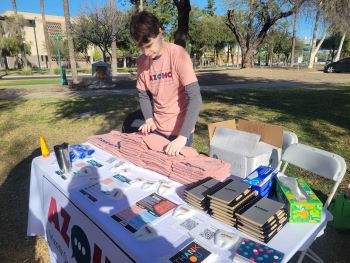Enter your email to receive the CareQuest newsletter:
May 20, 2024
Nearly all Arizonans say oral health is important to them. But not all Arizonans have an easy time accessing care — especially those individuals without dental coverage. Arizona Medicaid adult dental benefits only cover emergencies and are capped at $1,000 with very few exceptions.
For almost a decade, the Arizona Oral Health Coalition (AZOHC) has been working to change that and expand the Medicaid adult dental benefit in the state. Stories have been at the heart of that work — stories like Janessa’s.
“I was in a crosswalk and struck by a bus,” Janessa, who is insured through state Medicaid, told AZOHC. “With dental, you’ll go to the emergency room, and they’ll treat anything but your teeth. And your teeth can be hanging, and they will give you antibiotics and tell you, ‘Go to a dentist.’ The only thing they will do for emergency dental is pull your teeth, but then I’d be walking around with no three front teeth. This isn’t appearance, this is health. Teeth are your health. You get an infection. You can get very ill. It can be deadly.”
Another Arizonan, Kenard Uber, testified in front of a Senate committee meeting about his struggles in accessing oral health care.
“My perspective on this matter comes from lived experience, as someone who has navigated substance use recovery while relying on Medicaid and facing dental adversities,” Uber testified. “In the realm of recovery, I’ve witnessed numerous individuals grappling with untreated dental issues and oral pain due to financial constraints. Many of these individuals are currently reliant on Medicaid for their health care needs. Let’s focus on the significance of addressing emergency dental pain. This type of pain often becomes a catalyst for opioid addiction and relapse. Comprehensive dental services could play a pivotal role in mitigating this issue.”
With the support of grants from CareQuest Institute, AZOHC is working to show legislators in the state the importance of oral health and its relationship to overall health. Brianna Miller, coordinator for AZOHC, continues to lead the effort.
“A really important aspect of the development of that campaign started with an understanding that data and numbers around cost savings are important,” Miller says. “But the true power lies in the experiences of Arizonans who have been most impacted by oral health disparity.”
Progress and Persistence to Fund a Dental Benefit
In 2019, AZOHC first advocated for a dental benefit that would help pregnant people.
“But ultimately, because of the cost as well as a sort of general unwillingness to expand Medicaid or some very fiscally conservative politics, we never saw that bill cross the finish line,” says Miller.
In 2020, CareQuest Institute helped facilitate an agreement between AZOHC, a grantee, and another grantee, Children’s Action Alliance, to work together on a shared vision of oral health advocacy. Through this partnership, the coalition started to develop a campaign called “Oral Health Is Essential Health” to begin advocating for a comprehensive benefit at the state legislature.
“We set out to talk to Arizonans living in rural areas, BIPOC Arizonans, veterans, pregnant women, those with disabilities, foster youth. We tried to capture as many diverse voices as we could,” Miller says. “And we’re able to hear their stories and their experiences on being able to access or not being able to access oral health care in Arizona.”
In 2023, with the help of the campaign and personal experiences from people like Kenard and Janessa, AZOHC made some progress.

“We saw a preventive benefit,” Miller says. “So, this benefit was not fully comprehensive, but it was looking at providing some very basic benefits — two exams, one X-ray, and two basic cleanings per year.”
It passed through the state House and Senate, but it wasn’t funded in the budget.
“But that was really encouraging as we hadn’t seen an oral health bill make it that far in a while,” Miller says.
This year, they tried again — this time with a comprehensive bill.
“This comprehensive bill is a simple bill: It just changes the word prevent[ive] to comprehensive. So of course, the different services and things that would be included in that would be worked out through rulemaking administratively,” Miller says.
The bill passed in the Senate with bipartisan support, but also, like the last bill, will be tied up in the budget.
“There’s a pretty steep deficit this year, so we knew that going into this year we likely wouldn’t see something pass,” Miller says.
Still, voices matter. And the volume is growing.
“We brought over 50 oral health advocates out to educate lawmakers [during Lobby Day],” Miller says. “We were able to leverage some pretty compelling data this year — which was also supported by CareQuest Institute — on the long-term cost savings that are associated with an adult dental benefit. And I think we’ve secured a pretty solid pathway for future success when we see some budget windfalls.”
What’s next for AZOHC?
“We hope to continue educating lawmakers,” Miller says, “and build momentum around a comprehensive benefit, which we know will benefit the majority of Arizonans that need this oral health care.”